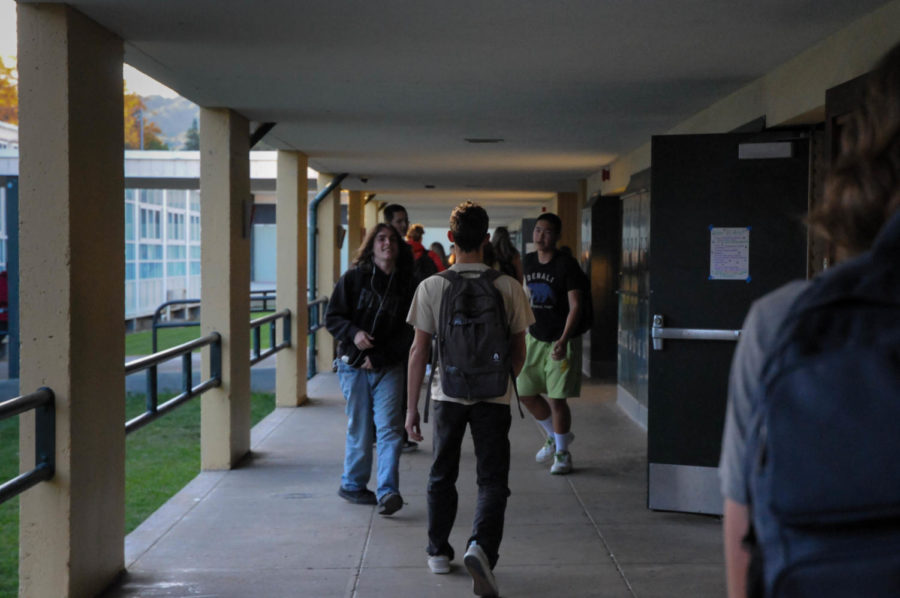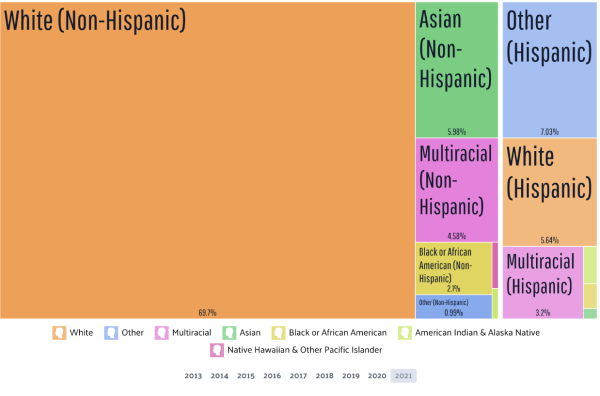Has pandemic isolation caused a mental and sexual outburst?
Archie Williams students congregate in front of their history class during passing period.
Class of ‘25 survey results raise questions on health related activities.
Is there an appropriate age to first have sex? What about a healthy amount of sexual partners? How do grades at Archie Williams differ in sexual activity?
The previous school year’s California Healthy Kids Survey prompted the above questions after uncovering inconsistencies between last year’s freshmen and older grades. Current sophomores are candidates for having some of the most difficult times during the pandemic. They suffered through much of their formative middle school years online and entered freshman year without much preparation for the social turmoil of high school. Due to stress from this isolation, Stanford studies have found that the mental age of adolescents has increased by approximately three years. The studies suggested that last year’s freshmen entered high school with the mental age of juniors.
The survey focused on topics such as drug and alcohol use, mental health issues, the school environment, and sexual activity. What caused current sophomores to respond with such drastic contrast to other grades?
In the mental health section of the survey, students were asked to report if they had seriously considered attempting suicide in the past 12 months. Eight percent of last year’s seniors answered yes, compared to 20 percent of last year’s freshmen.
The alarming difference between the previous school year’s freshmen and seniors concerned observers. Illegitimate survey answers are a possibility, but Archie Williams’ Wellness Outreach Specialist, Danya Axelrad-Hausman, thinks that admin accounts for fluctuation in data. Axelrad-Hausman believes that the data reported by the California Healthy Kids Survey is accurate and can allow insight into the health of students.
In the 2017-2018 school year, 12 percent of freshmen had seriously considered attempting suicide in the past 12 months. Since then, there has been an eight percent increase of freshmen in this category. This increase appears concerning for the mental health of last year’s freshman class, raising questions regarding whether this trend is permanent or not. Post-lockdown, current teenagers are dealing with mental health issues such as suicidality, depression, and anxiety, more than older generations. However, Axelrad-Hausman also sees a connection to the destigmatization of once taboo issues such as suicide and sex as the reason for increased numbers.
“Thinking back to when I was in high school, mental health and suicidality was just not talked about openly or publicly…People didn’t really talk about [mental health and suicide] on social media],” Axelrad-Hausman said. “What I hear and see now is social media as a channel where a lot of people talk about mental health, post about their own mental health, and might talk about their suicidality or suicidal ideation. And because the language is more out there and more available, I wonder if more people now feel comfortable describing how they feel in that way, because it feels more accessible or more visible outside of themselves.”
A sophomore at Archie, who prefers to remain under the anonymous name Charlie, agrees with Axelrad-Hausman.
“I don’t want to say [suicide] has been normalized, but it kind of has been, now it’s been brought up a lot more so people are more able to recognize it,” Charlie said.
In the sexual behavior portion of the survey, students were asked questions about the quantity and safety of their sexual activity. Initially, students answered whether they had ever had sexual intercourse. If their response was yes, then they were taken to another part of the survey that asked more questions regarding sexual behavior.
Students were then asked the number of sexual intercourse partners they had in the past three months. Of the 13 percent of freshmen that said they have had sexual intercourse, 20 percent said that they had sex with six or more people in the past three months, and 33 percent said that they have had sex with six or more people in their lifetime. That class’ freshmen statistics were far higher than any other grades, which averaged from five to ten percent.
Current sophomores never experienced comprehensive in-person sexual education due to the COVID-19 pandemic. Although schools provided online classes, zoning out or disregarding the lesson was an easy habit to build.
“I think there’s some truth to the [survey results regarding sex] because they missed out on a lot of that sex education [during COVID-19]. When it’s on an online class, you can completely tune it out. You can tune out uses of protection, possible risks, and possible harm reduction techniques,” said senior and Peer Resource member Sophia Nowlen.
Once isolation ended, teenagers were anxious to return to “normal” teenage activities. A sophomore at Archie Williams, who prefers to remain under the anonymous name Nicky, recognized this eagerness and how it continues to play out.
“I think everyone had these super high expectations jumping back into high school because, in the grade that I was in, it was known as a time to become an adult. I think that [experimenting] peaked especially last year because everyone just had a mindset of jumping back [in] and resuming,” Nicky said. “People got ahead of themselves and I think for some people, it clicked that their actions were extreme [and they mellowed out] and for others, they’re still doing it.”
Leaving seventh grade during the pandemic and re-entering in-person school as high schoolers left the incoming freshmen in uncertainty. They went from being the oldest and most experienced grade at their school, to the youngest and most naive grade.
“All you see is upperclassmen and all you see is other people giving that example of sexualization and kind of maturity. You feel like you have to amount to that [because you think], it’s just something that everybody’s doing. When in reality, that’s not true,”
— Sophia said
Lack of sexual education and social interaction are aspects of ‘normal’ life that got lost. However, using the pandemic as a cause does not cover the whole issue. The increasing use of social media could also be considered as a root of the problem. According to NPR, 53 percent of kids in the U.S. own a cell phone by the age of 11. Owning a cell phone comes with exposure to news, music, and media, all glamorizing sex and drugs. Media provides endless rabbit holes of information, and there are no barriers to what today’s younger eyes have access to.
“I feel like the younger generations were exposed to the media a lot sooner than older generations. [They] were exposed to media romanticizing drug use,” said sophomore Luci Borba.
Media romanticizes not only drugs but sex, non-consentual sex, and suicidality as well.
Is an increase in media use combined with isolation from the pandemic the culprit for these rising data points? And is this data even a bad thing, or have they always existed? It’s possible that social media’s access and sharing of information provided people with a better understanding of issues like suicide and sexual activity, shining light on the always present numbers.
Your donation will support the student journalists of Archie Williams High School. Your contribution will allow us to purchase equipment and cover our annual website hosting costs. Each donation will receive a magazine subscription for a year (6 copies a year), and become a part of the important work our publication is doing.
$35 -- Subscription to the magazine
$50 -- Silver Sponsorship
$75 -- Gold Sponsorship
$100 -- Platinum Sponsorship

Lucas is a sophomore, in his second year of journalism. He enjoys swimming and playing water polo for the Water Devils and Thunder Coast Aquatics. You...

Jasmin is a senior, in her third year of journalism. She enjoys eating grapes and pretzels at the same time. You can often find her listening to Bad Bunny...

Ezra is a sophomore who has been in journalism for a year and a half. In his free time he likes playing basketball, and you can often find him working...












